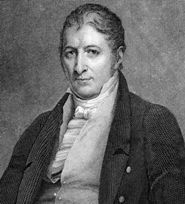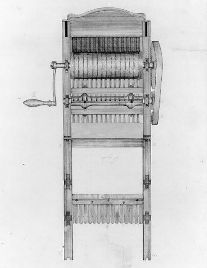Part A & Part B
Assignment PART A:
Read the essay on Eli Whitney and the cotton gin.
Answer the comprehension questions. Be sure to answer with complete sentences.
Indicate
Usually we indicate ONE example of every required stylistic requirement.
In THIS assignment you are to indicate more than one example of each required stylistic requirement.
See the checklist at the bottom to find out how many of each stylistic requirements should be indicated.
Fill out the checklist to reference (and double check) your indications.
Eli Whitney
by Charles Bird King
edited by Soutenus

Eli Whitney, the ingenious inventor of the cotton gin, was born on December 8, 1765 in Westborough, Massachusetts. His parents, Eli and Elizabeth Whitney had four children and Eli was their oldest. While growing up on the farm with his two brothers and one sister, Eli enjoyed working in his dad's workshop.
Young Eli was more interested in tools and machines than farming. As a child, he showed enormous artistic, practical, technical talent. At only 12 years old he built a fiddle in his father's workshop. After that, the local musicians would bring their instruments to Eli for repairs. Because he enjoyed challenges, he often spent his time taking things apart, tinkering with them, and putting them back together. He wanted to discover the answers to all the whys and hows. One day, Eli took apart his father's valuable watch to figure out how such a wondrous thing worked. Then he realized he would have to put it back together or he would be in huge trouble. He carefully reassembled the small pieces remembering exactly how everything fit back together. Luckily for Eli, the watch worked perfectly.
After high school, Whitney attended Yale College. There he studied a variety of subjects including mathematics, Greek, Latin, and philosophy. Upon graduating in 1792, he hoped to study law, but was short on money so he accepted a job as a tutor in Georgia.
While traveling to Georgia, Whitney met a lady named Mrs. Greene. Mrs. Greene was the widow of the Revolutionary War hero General Nathaniel Greene. She owned a large plantation called Mulberry Grove in Georgia. The two became close friends. In fact Whitney decided to turn down his tutoring job and ended up staying at Mulberry Grove. Disappointed but resolved, Eli turned down the job because he had been misled about the salary. This decision changed his life.
While at Mulberry Grove, Whitney learned about the production of cotton. He discovered that most plantations could only grow a type of cotton called "short staple" cotton. However, short staple cotton was extremely difficult and expensive to clean. Many plantation owners in the South had stopped growing cotton because it was simply not cost effective. The seeds had to be removed by hand which was slow and tedious. It could even be painful. Cotton “bolls,” which are the rounded mature fruit of the cotton plant, are sharp and pointy. Building something to help clean the seeds from the cotton with greater efficiency was the perfect challenge for Eli. Whitney enjoyed building machines. Even more than that, he loved solving problems.
That winter, Eli invented a machine he called the cotton gin. The "gin" in cotton gin is a shortened version of the word "engine." Using a wire screen in combination with small hooks, the cotton gin pulled the cotton fibers through the tightly crisscrossed mesh. Eli Whitney’s new machine could clean more cotton in a few hours than a group of workers could in a day. The cotton gin was like a miracle to the people of the late eighteenth century. It certainly revolutionized the cotton industry of America.
With the help of his business partners, Whitney obtained a patent for his new invention and made plans to make his fortune. However, things didn't work out for him. Motivated by greed, competitors simply copied his new machine while Whitney was unable to stop them. At first he fought them in court although he eventually ran out of money.
Although Whitney did not become rich, many plantation owners in the South did. Because the patent failed to stop others from copying his idea, Whitney did not reap any financial benefits. On the other hand, plantation owners who used cotton gins were able to make a lot of money by growing, harvesting, and selling cotton. Using the cotton gin made a huge difference in these plantation owners’ lives. Unfortunately, this had the unintended consequence that more enslaved people were needed to pick cotton from the fields. Over the next several years, the enslaved became even more important and valuable to plantation owners. Sighting this rise in demand for enslaved workers, historians make a compelling argument for a more positive ramification of the cotton gin. Some historians point to the cotton gin's impact on slavery as an eventual cause to the Civil War.
Although the cotton gin did not make Whitney rich, he did become famous. Undeterred, Eli Whitney used this fame to advance his particular idea of interchangeable parts for manufacturing. Securing a contract from the government to produce muskets led to a transformation in the way the weapon was manufactured. Whitney did not actually invent the idea of using interchangeable or standardized parts. However, Whitney was one of the first to carry out and perfect "the interchangeable system" of manufacturing. This important contribution put him at the forefront of the growth of American industry. Eli Whitney’s innovations made a significant impact on the world. Who knows how much more he would have contributed had he not died at the relatively young age of 60. Eli Whitney died on January 9, 1825 of cancer.
How well did you understand? COMPREHENSION QUESTIONS
1) Where did Eli Whitney grow up?
2) Which sentence is the best synopsis?
a) Eli Whitney changed the course of history in the southern United States with the invention of the cotton gin.
b) Eli Whitney was born in the 1700s
c) Eli Whitney repaired instruments as a child.
d) Eli Whitney is remembered as the Father of Invention.
3) What kind of cotton was difficult to clean?
4) What does the word “gin” mean in “cotton gin”?
5) What problem did Whitney encounter associated with patents?
6) What was an unintended negative consequence of this invention?
7) What timeline influence did it have according to some historians?
8) Did Whitney become rich because of his ingenious patent?
9) What is a cotton “boll”?
10) How old was Eli Whitney when he died?
—----------------------------------------------------------------------------------------------------------------
Checklist Requirements Specific to THIS Assignment
w/ws
Find 3, label in original essay, and record them here:
lys
Find 4, label in original essay, and record them here:
Note: the adverb must modify a verb to count.
asias
Find 3, label in original essay, and record them here:
bcs
Find 2, label in original essay, and record them here:
QAs
Find 12, do NOT label in original essay. Simply record them here:
SVs
Find 11, do NOT label in original essay. Simply record them here:
(S)s
Find 2, label in original essay, and record them here:
(1)s
Find 2, label in original essay, and record them here:
(2)s
Find 8, label in original essay, and record them here:.
(3)s
Find 1, label in original essay, and record here:
(4)s
Find 2, label in original essay, and record them here:
(5)s
Find 6, label in original essay, and record them here:
(6)s
Find 3, label in original essay, and record them here:
(7)s
Find 2, label in original essay, and record them here:
(8)s
Find 1 (8) and find 1 (article +8), label in original essay, and record them here:
DECs
Find 3, label in original essay, and record them here:
M3s
Find 3, label in original essay, and record them here:
OWL
Find 1, label it in the original essay, and record them here:
TT/CC - What type of TT/CC was used?
—----------------------------------------------------------------------------------------------------------------